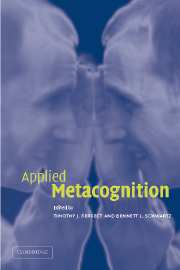11 - Metacognition research: an interim report
Published online by Cambridge University Press: 22 September 2009
Summary
Recent years have witnessed a trend toward the establishment of metacognition as a field of investigation in its own right that pulls together researchers from a variety of areas. These areas include memory research, developmental psychology, judgment and decision-making, neuropsychology, reasoning and problem solving, social psychology, forensic psychology, educational testing, and consciousness. The few edited volumes that have appeared in recent years on metacognition illustrate the tendency of researchers from disparate areas of investigation to bring their research under the common umbrella of metacognition. This volume is also a witness to this tendency, which I expect to intensify in the years to come.
In this overview chapter, I will begin by pointing out the basic assumptions that seem to underlie much of the experimental work on metacognition. I will then outline several lines of research on metacognition, and show how the chapters in this volume actually reflect the converging influence of these different lines of research. In the main part of the chapter I will focus on the basic issues in metacognition, pointing out some of the contributions of the research reported in this book to the emerging unified field of metacognition.
Basic assumptions
Metacognition, narrowly defined, concerns people's cognitions and feelings about their cognitive states and cognitive processes. However, the term metacognition has been also used more broadly to refer to cognitions about cognition in general, as well as self-regulation processes that take cognitive processes as their object (see Schneider and Lockl, this volume).
Information
- Type
- Chapter
- Information
- Applied Metacognition , pp. 261 - 286Publisher: Cambridge University PressPrint publication year: 2002
References
Accessibility standard: Unknown
Why this information is here
This section outlines the accessibility features of this content - including support for screen readers, full keyboard navigation and high-contrast display options. This may not be relevant for you.Accessibility Information
- 24
- Cited by
